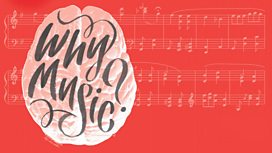
The Ear's Delight
Tamsin Greig and Alex Jennings read texts on the power of music, from Shakespeare to PG Wodehouse, St Augustine to Proust, and Baudelaire to Nick Hornby, including music spanning ten centuries, from Hildegard of Bingen to Beethoven and beyond.
David Papp (producer).
Last on
More episodes
Previous
![]()
Exploring what makes music a vital part of being human.
Music Played
Timings (where shown) are from the start of the programme in hours and minutes
-
![]() 00:00
00:00Claude Debussy
Prélude à laprès-midi dun faune (excerpt)
Performer: Berlin Philharmonic Orchestra, Claudio Abbado (conductor).- Deutsche Grammophon 4713322.
- Tr1.
-
Walter De la Mare
Music read by Tamsin Greig
Charles Baudelaire (Trans: William Aggeler)
La musique read by Alex Jennings
EM Forster
Howards End read by Tamsin Greig
![]() 00:05
00:05Ludwig van Beethoven
Symphony No.5 in C minor (movements III & IV)
Performer: Vienna Philharmonic Orchestra, Carlos Kleiber (conductor).- DG 447 400 2.
- Tr3 & 4.
PG Wodehouse
The Mating Season read by Alex Jennings
![]() 00:12
00:12Edward Elgar
Salut damour
Performer: Justine Zhang (violin) & Alan Chan (piano).- Private recording (with kind permission of Justine Zhang and Alan Chan).
- Tr0.
![]() 00:15
00:15Art Garfunkel
Bright Eyes
Performer: Art Garfunkel.- CBS 4663332.
- Tr3.
Nick Hornby
High Fidelity read by Alex Jennings and Tamsin Greig
![]() 00:20
00:20Solomon Burke
Got To Get You Off My Mind
- Rhino/Atlantic R2 70284 CD 1.
- Tr14.
![]() 00:21
00:21Hildegard von Bingen
Ave generosa
Performer: Margaret Philpot (voice).- Hyperion CDA66039.
- Tr5.
St Augustine
The Confessions (ed James McKinnon) read by Alex Jennings
Hildegard of Bingen
Ave generosa read by Tamsin Greig
Bible
1 Samuel Chapter 16, vs 14 23 read by Tamsin Greig
![]() 00:26
00:26Giulio Caccini
Amarilla mia bella
Performer: Andrew Lawrence-King (harp).- Hyperion CDA6629..
- Tr13.
![]() 00:27
00:27Johann Sebastian Bach
Concerto for Two Violins in D minor, BWV 1060
Performer: Andrew Manze & Rachel Podger (violins), Academy of Ancient Music.- Harmonia Mundi HMX2907155.
- Tr8.
Robert Herrick
To Music, to becalm his fever read by Alex Jennings
![]() 00:33
00:33Oliver Sacks
Musicophilia, Ch. 5 Brainworms, Sticky Music and Catchy Tunes read by Alex Jennings
![]() 00:34
00:34Jimmy Van Heusen
Love and Marriage
Performer: Frank Sinatra, Orchestra conducted by Nelson Riddle.- EMI 723483595228.
- Tr10.
![]() 00:01
00:01Henry Cowell
The Banshee
Performer: Henry Cowell (piano).- Smithsonian Folkways SFWCD40801.
- Tr9.
Emily Dickinson
The fascinating chill that music leaves read by Tamsin Greig
Peter Schaffer
Amadeus read by Alex Jennings
![]() 00:37
00:37Wolfgang Amadeus Mozart
Adagio from Serenade for 13 wind instruments in B flat major (K.361),
Performer: Bläserensemble Sabine Meyer.- EMI 509994575242.
- Tr2.
Anita Lasker-Wallfisch
Inherit the Truth read by Tamsin Greig
![]() 00:44
00:44Ludwig van Beethoven
Adagio cantabile from Piano Sonata in C minor, Op.13 �ʲ��ٳ�é�پ���ܱ�
Performer: Daniel Barenboim (piano).- EMI CDC 7473452.
- Tr2.
![]() 00:50
00:50Dmitry Shostakovich
Symphony No. 8 in C minor (movements III & IV)
Performer: Concertgebouw Orchestra, Bernard Haitink (conductor).- Decca 411 616-2.
- Tr3 & 4.
Walt Whitman
Beat! Beat! Drums! read by Alex Jennings
![]() 00:54
00:54Evan and James James
Hen Wlad Fy Nhadau (Land of My Fathers)
Performer: The Fron Male Voice Choir.- UCJ 4765720.
- Tr4.
Siegfried Sassoon
Everyone Sang read by Alex Jennings
![]() 00:55
00:55Ralph Vaughan Williams
The Lark Ascending
Performer: Hilary Hahn (violin), London Symphony Orchestra, Colin Davis (conductor).- Deutsche Grammophon 430 2602.
- Tr4.
![]() 00:59
00:59Spencer Williams
Basin Street Blues
Performer: Louis Armstrong (trumpet and voice), Trummy Young (trombone), Barney Bigard (clarinet), Billy Kyle (piano), Arvell Shaw (bass), Kenny John (drums).- Jazz Unlimited JUCD 2004.
- Tr10.
Melvin B Tolson
Satchmo read by Tamsin Greig
Marcel Proust (trans C. K. Scott Moncrieff)
Swanns Way read by Alex Jennings
![]() 01:06
01:06César Franck
Violin Sonata in A major
Performer: Kaja Danczowska (violin) & Krystian Zimerman (piano).- Deutsche Grammophon 4775903.
- Tr4.
William Shakespeare
The Merchant of Venice, Act 5, Scene 1 read by Alex Jennings and Tamsin Greig
![]() 01:10
01:10George Frideric Handel
Eternal source of light divine from Birthday ode for Queen Anne
Performer: Elin Manahan Thomas (soprano), David Blackadder (trumpet) Orchestra of the Age of Enlightenment, Harry Bicket (conductor).- Heliodor 4765970.
- Tr1.
Producer's Notes - The Ear's Delight
‘The language where all language ends’: music’s unique power is the subject of this edition of Words and Music with Tamsin Greig and Alex Jennings.
For Walter de la Mare and Charles Baudelaire, music is affecting, transporting and transformative, qualities reflected in the surging, impassioned score of Debussy’s Prélude à l’après-midi d’un faune.
In EM Forster’s Howard’s End, a group of concert-goers attend a performance of Beethoven’s Fifth Symphony. Mrs Munt likes to tap surreptitiously; Margaret only sees the music; Tibby follows the score; the German-ness of what she hears is the thrill for Fräulein Mosebach. But for Helen, ‘who can see shipwrecks and heroes in the music’s flood,’ it’s an overwhelming experience – especially the last movement.
Bertie Wooster would be letting us down if he succumbed to an overwhelming musical experience. PG Wodehouse’s The Mating Season sees the likeable dimwit summoned to the country by his Aunt Agatha (the one who chews broken bottles and kills rats with her teeth) in order to ‘stiffen up the programme’ of a village concert ‘with a bit of metropolitan talent’. As Bertie waits his turn, he fails to be moved by a violin solo: ‘I’m not really authority on violin solos,’ he cheerfully admits, ‘It was loud in spots and less loud in other spots and it had that quality which I have noticed in all violin solos, of seeming to last much longer than it actually did.’
Rob Fleming defines himself – and everyone else – by music. In this extract from Nick Hornby’s nineties novel High Fidelity, Rob, 36 going on 15, gets the hump on a car journey because he disapproves of his girlfriend’s compilation tape (remember them?). Maybe ‘disapproves’ is not quite the mot juste. Because for Rob, liking the wrong sort of music leads to ‘the bitterest of all battles between men and women…“How can you like Art Garfunkel AND Solomon Burke?”’
From the fourth century comes St Augustine’s celebrated autobiography, The Confessions, which helped establish the link between sensual pleasure and sin in western Christianity.�� In this passage Augustine grudgingly admits the power of sung prayer but warns that enjoying singing should be guarded against. ‘The delights of the ear had enticed me and held me in their grip’ – not good. ��Abbess Hildegard of Bingen thought otherwise. The ‘Sybil of the Rhine’, whose advice was sought by the eleventh century great and good, had extraordinary and varied talents, among them writing religious poetry set to music.�� Ave generosa is an ardent entreaty to sing the praises of the Virgin which fairly throbs with an eroticism matched by the ecstatic vocal line of the music. Towards the end of her life, as punishment for burying an excommunicated person in her convent’s consecrated ground, the authorities hit Hildegard where it hurt and deprived her and her nuns of the consolation of the sung Office.
When an evil spirit from the Lord troubled him, King Saul found that music therapy did the trick, as supplied by David and his harp; and Robert Herrick likewise invokes music ‘ to becalm his fever’. Music messes with the mind of Oliver Sacks’s friend when an intractable earworm stays with him for ten days. Even recounting the story to Sacks years later is enough to make ‘Love and Marriage’ (as sung by Frank Sinatra) return for several hours. Emily Dickinson’s unsettled mind seems reflected in The fascinating chill that music leaves and Henry Cowell’s spooky piano piece, The Banshee.
A striking ��scene in Peter Schaffer’s Amadeus comes when Salieri remembers hearing the Adagio from Mozart’s Serenade for 13 Wind Instruments which begins ‘like a rusty squeezebox’ but within a few bars sounds like ‘the voice of God.’
Music literally saved the remarkable Anita Lasker-Wallfisch, an Auschwitz prisoner who happened to be a cellist and became part of the Lagerkapelle, or camp orchestra. Its role was to play marches as the prisoners went in and out of the camp at the beginning and end of each day, and she witnessed unimaginable cruelty and atrocities. One evening, playing a string quartet arrangement of Beethoven’s �ʲ��ٳ�é�پ���ܱ� Sonata, the players ‘were able to raise ourselves high above the inferno of Auschwitz into spheres where we could not be touched by the degradation of camp existence.’
Music born of World War II, Shostakovich’s Eighth Symphony, is the foil for Walt Whitman’s ‘Beat! Beat! Drums!’ with its relentless beating drums and blowing bugles, symbolic music of the implacable, indiscriminate destruction of war. Siegfried Sassoon’s Everyone Sang, written just after the signing of the Armistice in November 1918, describes a spontaneous outburst of song among the soldiers. Sassoon’s regiment was the Royal Welch Fusiliers and I’ve imagined his men, at once relieved, war-weary and homesick, singing Hen Wlad Fy Nhadau (Land of My Fathers). At the lines ‘O, but Everyone / Was a bird; and the song was wordless; the singing will never be done’ the music segues to Vaughan Williams’s The Lark Ascending.
The power of an individual’s music-making is celebrated in Melvin B Tolson’s Satchmo where even the Archangel Gabriel, having blown his horn on Judgement Day, accepts he’s been bested by Louis Armstrong:���� “I’d be the greatest trumpeter in the Universe / if old Satchmo had never been born!”
Never mind the madeleine and cup of tea in Proust’s great novel on the nature of memory, Remembrance of Things Past. It’s a piece of music – a violin sonata by ‘Vinteuil’ – that really does it for Charles Swann, causing profound personal revelation in a way that puts his teatime vittles to shame. And to go with this extract is one the most plausible suggestions for the actual music Proust may have had in mind: César Franck’s Violin Sonata.
Shakespeare to end: his famous passage on the power of music from The Merchant of Venice where Lorenzo tells Jessica how ‘The man that hath no music in himself, / Nor is not moved with concord of sweet sounds, / Is fit for treasons, stratagems and spoils; / The motions of his spirit are dull as night / And his affections dark as Erebus: / Let no such man be trusted. Mark the music.’ (You’ll never think of Bertie Wooster in the same way again.) Making the point for Lorenzo is Handel’s ‘Eternal source of light divine’. I hope it works for you!
��
Broadcast
- Sat 26 Sep 2015 16:00���˿��� Radio 3



